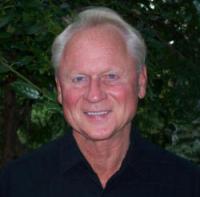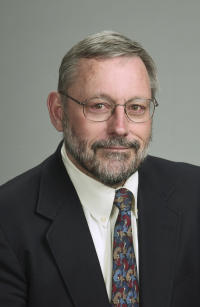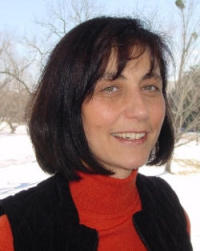
|
The Mathematical Association of America Maryland-District of Columbia-Virginia Section |
- Home
- History
- Main History Page
- Section History Document
- List of Past Officers
- Charter Members
- African-American Participation
- Stories from Section Members
- Section NExT Fellows
- Obituaries
- Smith Award Recipients
- Christensen Award Recipients
- Meritorious Service Award Recipients
- Undergraduate Award Winners
- Meeting Archive
- Past Meetings
- Talk Archive
- Old Section NExT Programs
- Newsletter Archive
- Meeting Minutes Archive
- Miscellaneous Documents
- Meetings
- Minutes
- Fall 2024 Executive
- Fall 2024 Membership
- Spring 2024 Executive
- Spring 2024 Membership
- Fall 2023 Executive
- Fall 2023 Membership
- Spring 2023 Executive
- Spring 2023 Membership
- Fall 2022 Executive
- Fall 2022 Membership
- Spring 2022 Executive
- Spring 2022 Membership
- Fall 2021 Executive
- Fall 2021 Membership
- Spring 2021 Executive
- Spring 2021 Membership
- Fall 2020 Executive
- Fall 2020 Membership
- Fall 2019 Executive
- Fall 2019 Membership
- Spring 2019 Executive
- Spring 2019 Membership
- Fall 2018 Executive
- Fall 2018 Membership
- Spring 2018 Executive
- Spring 2018 Membership
- Fall 2017 Executive
- Fall 2017 Membership
- Spring 2017 Executive
- Spring 2017 Membership
- Minutes Archive
- Newsletters
- Section NExT
- Awards
- Students
- Links
- Search
Fall 2008 Meeting at Hood College
The Friday afternoon workshop was held in the Hodson Science and Technology Center. Mike Bardzell from Salisbury University presented the workshop entitled Abstract Algebra Meets Fractal Geometry. The Friday evening banquet took place in the Whitaker Campus Center and Robert Lewand of Goucher College presented the banquet address Tales from the Crypt: Anecdotes from the Annals of Cryptology. On Saturday, we had two invited addresses. Bob Devaney from Boston University talked about Chaos in the Classroom and Raina Robeva from Sweet Briar College presented A Slot Machine, a Test Tube, and the Timing of Evolutionary Changes. Invited Addresses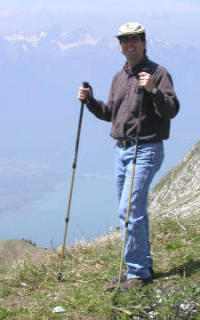
Mike BardzellSalisbury UniversityWorkshop: Abstract Algebra Meets Fractal Geometry Abstract: Pascal's Triangle contains a plethora of interesting combinatorial and number theoretic properties that have been studied extensively over the years. But there are also some interesting connections that can be made with group theory. In this workshop we will generalize Pascal's triangle to other structures generated over finite groups. These structures can exhibit self-similar properties and, in many cases, a basic type of fractal dimension can be defined. Participants will be introduced to the PascGaloisJE software system and applets to create colorful graphical images, perform a variety of computations, and see how these fractal-like images can be related back to abstract algebra concepts such as closure, subgroups, and quotient groups. Biographical Sketch: Mike Bardzell received a B.S in Physics from Mary Washington College in 1989 and a Ph.D. in Mathematics from Virginia Tech in 1996. Since then he has been a faculty member at Salisbury University where he enjoys teaching a variety of mathematics and computer science courses. In his spare time he enjoys camping with his family and cycling on the Eastern Shore.
Robert LewandGoucher CollegeBanquet Address: Tales from the Crypt: Anecdotes from the Annals of Cryptology Abstract: The field of cryptology is rich in both its history and folklore. This talk will include a selection of some of the more interesting stories that relate to this subject and will offer some cryptological challenges to the audience. Biographical Sketch: Robert Edward Lewand received his B.S. in mathematics from the University of Dayton, M.S. in computer science from the Johns Hopkins University, and Ph.D. in mathematics from the University of Virginia. He has been teaching at Goucher College since 1977.
Bob DevaneyBoston UniversityInvited Address: Chaos in the Classroom Abstract: In this talk we will describe a number of ways that contemporary topics in mathematics (chaos and fractals) can be easily introduced into a variety of introductory mathematics courses. This gives students a glimpse of some of the things that are new and exciting in mathematics. As a subtheme, all of these topics will be displayed and animated using spreadsheets. Biographical Sketch: A native of Methuen, Massachusetts, Robert L. Devaney is currently Professor of Mathematics at Boston University. He received his undergraduate degree from the College of the Holy Cross in 1969 and his PhD from the University of California at Berkeley in 1973 under the direction of Stephen Smale. (Bob's complete "mathematical" genealogy) He taught at Northwestern University and Tufts University before coming to Boston University in 1980. His main area of research is dynamical systems, primarily complex analytic dynamics, but also including more general ideas about chaotic dynamical systems. Lately, he has become intrigued with the incredibly rich topological aspects of dynamics, including such things as indecomposable continua, Sierpinski curves, and Cantor bouquets. He is the author of over one hundred research papers in the field of dynamical systems as well as a dozen pedagogical papers in this field. He is also the (co)-author or editor of thirteen books in this area of mathematics.
Raina RobevaSweet Briar CollegeInvited Address: A Slot Machine, a Test Tube, and the Timing of Evolutionary Changes Abstract: About 200 years ago John Baptist Lamark proposed his Theory of Acquired Trait hypothesis as a way to account for evolution. Fifty years later, in his work The Origin of Species, Charles Darwin introduced the alternative concept of Natural Selection. Both hypotheses maintained that life on earth has evolved from fewer simpler organisms to more and more complex life forms but contradicted themselves on the critical question of timing. Lamark claimed that organisms adapt in response to environmental stimuli, passing the changes on to their offspring. Darwin, on the other hand, asserted that changes occur continuously and independently of the environment but those organisms with variations that provide an advantage survive and those with a disadvantage gradually die out. It is a remarkable and, surprisingly, not a widely known fact that the dispute was finally settled through statistical and mathematical arguments in 1943. The talk will examine the laboratory experiments and the mathematical model and theory used by biologist Salvador Luria and physicist Max Delbrück in furnishing those arguments. The two scientists were awarded the Nobel Prize in Physiology and Medicine in 1969 in part for this work. Biographical Sketch: Raina Robeva is Professor and Chair of the Department of Mathematical Sciences at Sweet Briar College and the Chair-elect of the special interest group BIO SIGMAA of the MAA. She holds a Ph.D. degree in mathematics from the University of Virginia and has research interests spanning a wide range of topics including the Markov property of random fields, spectral synthesis in Bessel spaces, and mathematical modeling for the biomedical sciences. In the past five years she has co-directed MAA-sponsored faculty professional workshops in Mathematical and Computational Biology. Robeva has received funding for her research and educational projects from federal and private sources including the National Science Foundation, the National Institutes of Health, the Jeffress Memorial Trust, and the Commonwealth Health Research Board. She is also the lead author of the undergraduate textbook "An Invitation to Biomathematics" published this year by Academic Press. More information is available at her website http://www.faculty.sbc.edu/robeva. |
Copyright © 2012 - The Mathematical Association of America
Please send comments, suggestions, or corrections for this page to Brian Heinold at heinold@msmary.edu
Last Modified: 03/05/2012 - 09:16pm
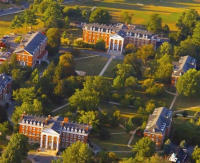 On November 7-8, 2008,
On November 7-8, 2008,
